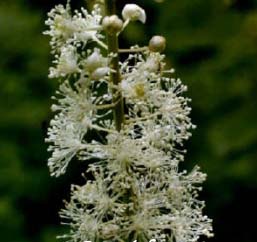Naturopathic health
Black Cohosh Herbal Remedy
Black cohosh informationHerbal practitioners most commonly use black cohosh (cimicifuga racemosa) for the treatment of menopausal symptoms, PMS and arthritis. Black Cohosh can be used for:Menopausal symptoms Pre-menstrual syndrome Cramps Neuralgia & nerve pains Arthritis One recent study has shown it may reduce the risk of breast cancer. See black cohosh research Side effects and contraindicationsIt is advised that pregnant women should not take black cohosh. Some practitioners do however recommend its use for assisting childbirth as it stimulates uterine contractions during labour - it should not be used in conjunction with blue cohosh for this purpose The product is not suitable for children Allergies Patients with known allergies to black cohosh or other members of the Ranunculaceae plant family, such as buttercup, should avoid products that contain black cohosh. Black cohosh should be used cautiously in patients with a history of blood clots, strokes or seizures. In nature, black cohosh contains small amounts of salicylic acid. It is not known how much is present in commercially available preparations. As a result, patients with known allergies to aspirin or aspirin like products, such as nonsteroidal anti-inflammatory drugs, including ibuprofen (eg Nurofen), should avoid black cohosh. Active Compounds:Black cohosh contains triterpene, glycosidic and phenolic constituents. What Herbal Practitioners say about Black Cohosh Western herbal practitioners define black cohosh as an excellent antispasmodic useful for all nervous conditions such as neuralgia and nerve pains. However its major use is in the treatment of menopausal symptoms and ovarian insufficiency symptoms. some studies indicate it to be a phytoestrogen causing the body to act as if it has been administered estrogen but without stimulating the growth of estrogen sensitive tumours. Adult Tincture Dosage:Based on a tincture with a herb to alcohol ratio of 1:3 take 1ml to 1.5ml three times a day. Black cohosh is a powerful herb so be careful not to exceed around 30ml per week. Naturopaths
treat the whole person not just the disease or condition. That's why you
cannot use this site for diagnosis or treatment. The information we provide
should not be treated as a substitute for medical advice or treatment. We
recommend that you visit a qualified naturopath or find a GP who is sympathetic
to a naturopathic approach. Click
here for our full disclaimer.
Further reading: L Tierra, 2003, Healing with the Herbs of Life, Crossing Press D Hoffman, 2003, The holistic Herbal, Element Click here for research information about Black Cohosh
|
Research homeHerbal remediesAdvice on buying herbal remediesBlack cohosh research
|
|
|
|
|
If you're starting to move towards a healthy diet and you want to take a major step forward then a detoxification programme can make a big difference. Click on the link below to find out more. Healthy Recipes Juicing SupplementsBach Flower Herbal Acupuncture Homeopathy DetoxificationMassage Qi Gong Nutrition & Diet Iridology Tissue Salts |

[Herbal Remedies][Ailments][Naturopathy][Contact][Community][Lifestyle][Home][Research]
Sponsored by Organic Herbal Remedies - Organic Herbal Tinctures







